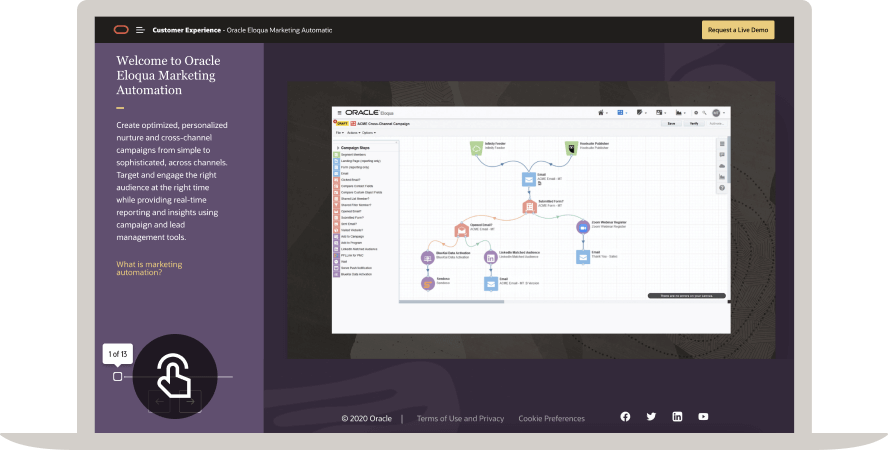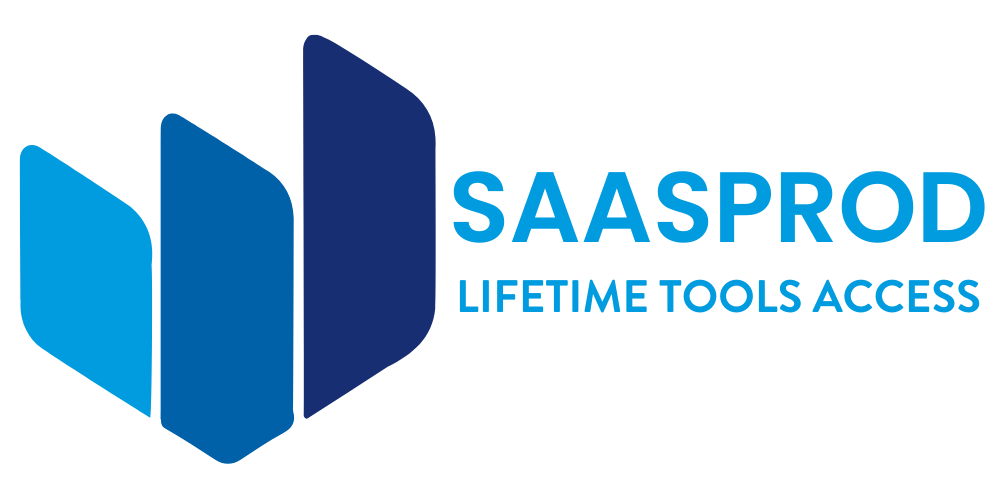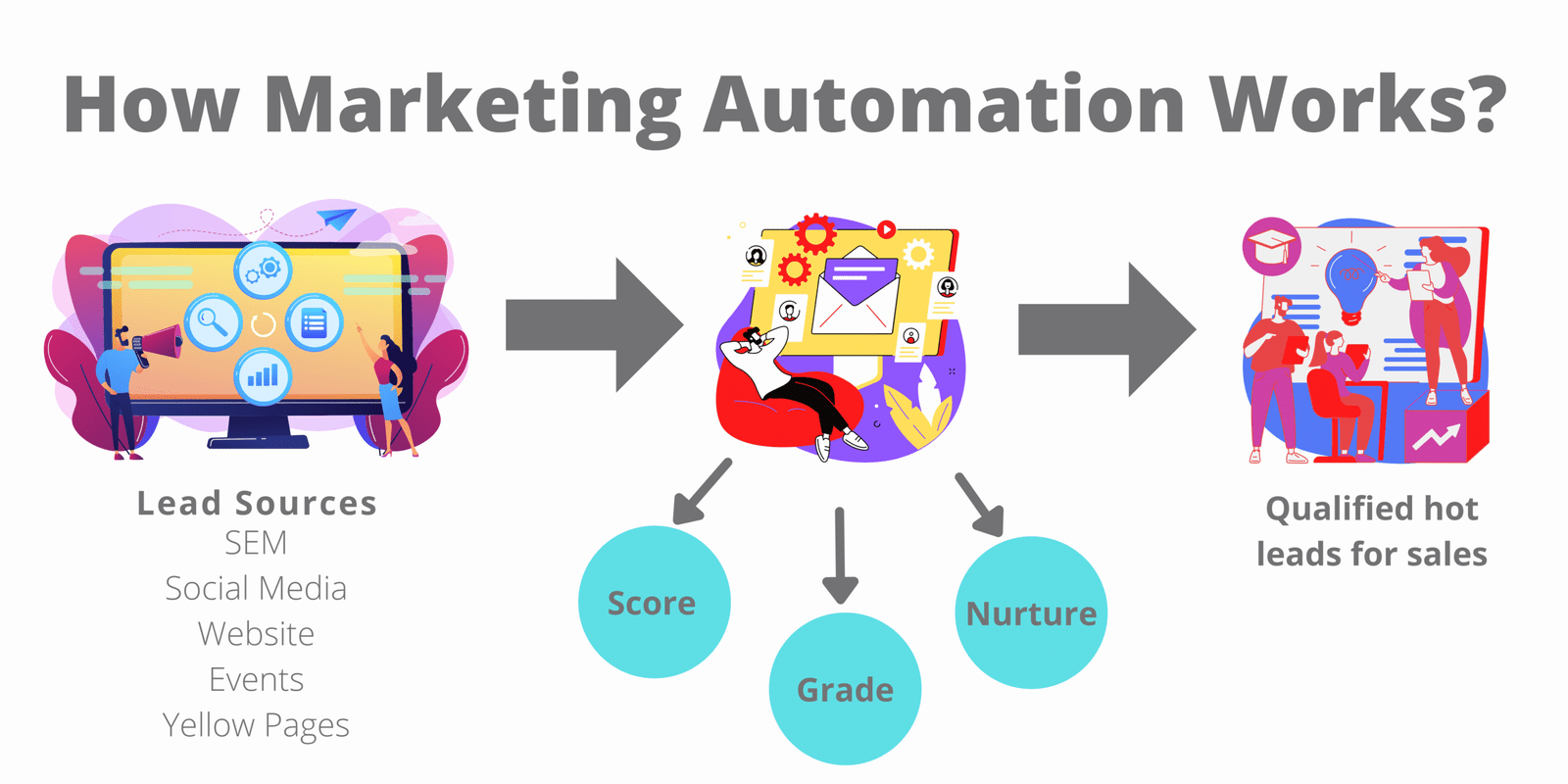Marketing automation software simplifies and streamlines marketing tasks. It helps businesses manage campaigns, track customer behavior, and enhance productivity.
In today’s fast-paced digital world, staying ahead in marketing can be tough. Marketing automation software comes to the rescue by handling repetitive tasks. It automates email marketing, social media posting, and ad campaigns, saving time and effort. Companies can now focus on strategy rather than mundane chores.
This software also provides valuable insights into customer behavior, helping businesses make informed decisions. With marketing automation, you can personalize customer interactions, improve engagement, and boost sales. Understanding how this software works can transform your marketing efforts and drive growth. Let’s explore its functionality and benefits.

Credit: www.oracle.com
Introduction To Marketing Automation
Marketing automation software helps businesses streamline their marketing efforts. It automates repetitive tasks and manages marketing campaigns across various channels. This software saves time and ensures consistency in your marketing efforts.
What Is Marketing Automation?
Marketing automation uses technology to manage marketing processes and campaigns. It helps automate tasks like email marketing, social media posting, and ad campaigns. This software tracks user behavior and personalizes messages based on their actions. It improves efficiency and helps marketers reach their audience with the right message at the right time.
Importance Of Marketing Automation
Marketing automation is crucial for businesses. It saves time by handling repetitive tasks, allowing marketers to focus on strategic work. It ensures consistent communication with customers. This consistency builds trust and keeps your brand top-of-mind.
Moreover, marketing automation helps in segmenting your audience. You can send personalized messages to different groups based on their interests and behavior. Personalized marketing improves engagement and conversion rates.
Lastly, automation provides valuable insights. It tracks and analyzes campaign performance. These insights help in making informed decisions and improving future campaigns. Marketing automation is key to efficient and effective marketing.

Credit: www.constantcontact.com
Core Features Of Marketing Automation Software
Marketing automation software streamlines tasks by automating emails, social media, and other digital marketing activities. It helps businesses engage with customers more effectively, track campaign performance, and generate leads. The software integrates with various platforms to provide a seamless marketing experience.
Marketing automation software is a powerful tool that can streamline your marketing efforts. By understanding its core features, you can make the most of this technology. Let’s dive into some of the essential aspects of marketing automation software.Email Marketing
Email marketing is a crucial feature of marketing automation software. It allows you to send targeted emails to your subscribers effortlessly. You can schedule emails, personalize content, and track open rates. Imagine being able to send a birthday email to each subscriber automatically. This personal touch can increase engagement and loyalty. You don’t have to worry about sending individual emails manually anymore.Social Media Management
Managing social media can be overwhelming. With marketing automation software, you can plan and schedule posts across various platforms. This ensures consistent engagement with your audience. You can monitor social media interactions and respond promptly. Think about saving hours of your day by automating your social media strategy. This way, you focus on creating quality content.Lead Scoring
Lead scoring helps you prioritize your prospects based on their behavior and engagement. Marketing automation software tracks actions like email opens and website visits. This data is used to assign scores to leads. Imagine knowing exactly which leads are ready to convert. You can tailor your approach to each lead’s readiness. This makes your marketing efforts more efficient and effective. In conclusion, these core features of marketing automation software—email marketing, social media management, and lead scoring—can transform your marketing strategy. How could these tools change the way you connect with your audience?How Marketing Automation Streamlines Workflow
Marketing automation software streamlines workflow by automating repetitive tasks. This saves time and reduces manual effort. It ensures consistency and accuracy in marketing activities. Let’s explore how this works in detail.
Automated Campaigns
Automated campaigns are a key feature. They allow you to set up email sequences, social media posts, and other marketing activities. Once set up, the software sends messages based on triggers. For example, it can send a welcome email when someone subscribes. This ensures timely communication without manual intervention.
Segmentation And Personalization
Segmentation divides your audience into smaller groups. This is based on characteristics like age, location, and behavior. Personalization tailors content to each segment’s needs. Marketing automation software makes this easy. It uses data to segment your audience. Then, it personalizes messages for each group. This improves engagement and conversion rates.
For instance, a clothing brand can send different emails to men and women. Each email contains products that suit their preferences. This targeted approach increases the chances of making a sale.

Credit: encharge.io
Integrating Marketing Automation With Crm
Marketing automation software streamlines tasks by integrating with CRM. This helps businesses manage customer relationships and marketing campaigns efficiently. It ensures personalized communication, saving time and improving customer engagement.
Integrating marketing automation with CRM can be a game changer for your business. It combines the power of automated marketing campaigns with the detailed customer data stored in your CRM system. This integration can streamline your marketing efforts, making them more effective and personalized.Data Synchronization
Data synchronization between your marketing automation software and CRM is crucial. Imagine your marketing emails aligning perfectly with your sales team’s follow-ups. This alignment happens because both systems share the same updated data. When a lead interacts with your marketing content, this information is instantly updated in the CRM. This ensures that your sales team is always aware of the latest activity. There’s no room for outdated information, reducing the chances of missed opportunities.Enhanced Customer Insights
Integrating these systems also enhances your customer insights. Every interaction, from email opens to website visits, is tracked and stored. This creates a detailed customer profile. These insights help tailor your marketing messages to individual preferences. It’s like having a personalized roadmap to your customer’s needs. This can significantly improve your conversion rates. How often have you received a generic marketing email? Doesn’t it feel impersonal? Now, think about receiving an email that addresses your specific interests. Which one would you respond to? By integrating marketing automation with CRM, you can ensure your customers feel seen and valued. This approach can foster stronger relationships and increase loyalty.Measuring Success With Marketing Automation
Measuring the success of your marketing automation efforts can be challenging, but it’s crucial to ensure you’re getting the most out of your tools. By leveraging analytics and key performance indicators (KPIs), you can gain insights into what’s working and what needs improvement. Let’s dive into the specifics of how you can measure success effectively.
Analytics And Reporting
Analytics and reporting are at the heart of measuring success. Marketing automation software provides you with detailed data on user behavior, campaign performance, and overall engagement.
Imagine you’ve just launched an email campaign. The software will track open rates, click-through rates, and conversion rates. This data helps you understand which emails are resonating with your audience.
Customizable reports allow you to focus on the metrics that matter most to your business. You can schedule these reports to be sent to your inbox, keeping you updated without having to log in constantly.
Key Performance Indicators
Key Performance Indicators (KPIs) are specific metrics that help you gauge the effectiveness of your marketing efforts. These could include lead conversion rates, customer acquisition costs, and return on investment (ROI).
Let’s say your goal is to increase lead conversions. Your KPIs might include the number of new leads generated, the conversion rate of these leads, and the cost per lead. By tracking these KPIs, you can adjust your strategies in real-time.
Setting clear KPIs ensures that everyone on your team is aligned and working towards the same goals. It also provides a benchmark to measure against, making it easier to see what’s working and what isn’t.
Are you consistently reviewing your KPIs to adjust your strategies? If not, you might be missing out on opportunities for improvement.
Measuring success with marketing automation is all about using the right tools and metrics to guide your decisions. By focusing on analytics and key performance indicators, you can make data-driven decisions that enhance your marketing efforts.
Choosing The Right Marketing Automation Software
Choosing the right marketing automation software can be challenging. There are many options available, and it is crucial to select the one that best fits your needs. This section will help you understand what to look for and some popular choices.
Factors To Consider
First, assess your business needs. Do you need email marketing, social media management, or lead scoring? Knowing your goals will narrow down your choices.
Next, consider the software’s ease of use. A user-friendly interface can save time and reduce frustration. Look for software that has a simple dashboard and clear instructions.
Third, check the integration options. Ensure the software can connect with your existing tools, such as CRM systems or e-commerce platforms. This will streamline your processes.
Also, evaluate the customer support. Reliable support can help solve issues quickly. Check if they offer chat, email, or phone support.
Lastly, think about the cost. Compare the pricing plans and see what features are included. Some offer free trials, which can help you decide.
Popular Software Options
There are several popular marketing automation tools to consider. HubSpot is a well-known option, offering a wide range of features. It is suitable for small to medium businesses.
Marketo is another strong choice. It is known for its advanced analytics and lead management capabilities. It is ideal for larger companies.
Mailchimp is popular for email marketing. It is easy to use and offers many templates. Small businesses often find it a good fit.
ActiveCampaign combines email marketing with automation and CRM capabilities. It is suitable for businesses looking for an all-in-one solution.
Finally, consider Pardot by Salesforce. It offers robust features for B2B marketing automation. It integrates well with Salesforce CRM.
Common Challenges And Solutions
Marketing automation software can streamline tasks, boost efficiency, and drive results. But it also presents some common challenges. These challenges can hinder the software’s effectiveness if not addressed properly. In this section, we’ll explore these challenges and provide solutions to overcome them.
Implementation Hurdles
Many businesses face obstacles during the initial setup. These hurdles can range from understanding the software to integrating it with existing systems. Users often find the learning curve steep. This can lead to frustration and delays.
The solution is to invest in proper training. Most software providers offer tutorials and customer support. Utilizing these resources can ease the learning process. Another solution is to start small. Implement one feature at a time. This gradual approach can help teams adapt better.
Maintaining Data Quality
Data quality is crucial for effective marketing automation. Poor data can lead to inaccurate targeting and wasted resources. Common issues include duplicate records, outdated information, and incomplete data.
To maintain data quality, regular audits are essential. Schedule periodic checks to clean and update your database. Use tools that can automate data cleansing processes. Ensure that data entry protocols are in place. This helps in minimizing errors right from the source.
Future Trends In Marketing Automation
Marketing automation software streamlines tasks like email campaigns and social media posts. It collects data to tailor content and measure performance. Businesses gain efficiency and improve customer engagement effortlessly.
Marketing automation software is constantly evolving, and understanding future trends can help you stay ahead of the competition. The future promises many exciting advancements, with AI and machine learning leading the charge. Increased personalization is also a crucial trend to watch, as it aims to enhance user experience and engagement.Ai And Machine Learning
AI and machine learning are transforming marketing automation. These technologies analyze vast amounts of data quickly, identifying patterns and trends that humans might miss. Imagine AI predicting which emails will get the most opens based on past behavior. This means more effective campaigns with less manual effort. AI also helps in segmenting your audience more precisely, targeting them with the right message at the right time.Increased Personalization
Personalization is no longer just a buzzword. It’s becoming a necessity. Marketing automation tools are now better equipped to create personalized experiences for users. Think about receiving an email that addresses you by name and suggests products based on your browsing history. Wouldn’t that feel more engaging? Increased personalization builds stronger customer relationships and boosts conversions. Marketing automation software is evolving rapidly. These future trends indicate how you can leverage new technologies to your advantage. Are you ready to embrace these changes?Frequently Asked Questions
How Does Marketing Automation Work?
Marketing automation uses software to streamline, automate, and measure marketing tasks. It helps in targeting customers with personalized messages. The system manages campaigns across multiple channels, nurturing leads and converting them into customers efficiently. This improves marketing efficiency and ROI.
How Does Automation Software Work?
Automation software executes tasks based on predefined rules. It uses algorithms to streamline processes, reducing manual effort. This boosts efficiency and accuracy.
How Does Marketing Software Work?
Marketing software automates tasks, analyzes data, and manages campaigns. It helps businesses target audiences, track performance, and optimize strategies.
Is Marketing Automation The Same As Crm?
No, marketing automation and CRM are different. Marketing automation focuses on streamlining marketing tasks. CRM manages customer relationships and interactions.
Conclusion
Marketing automation software simplifies tasks and enhances efficiency. It saves time and resources. Businesses can focus on strategy rather than repetitive tasks. Automation improves customer engagement through personalized messages. Tracking and analytics provide valuable insights. These insights help refine marketing efforts.
Overall, automation drives better results with less effort. Embracing this technology can transform your marketing approach. Start using automation to see the benefits firsthand.


